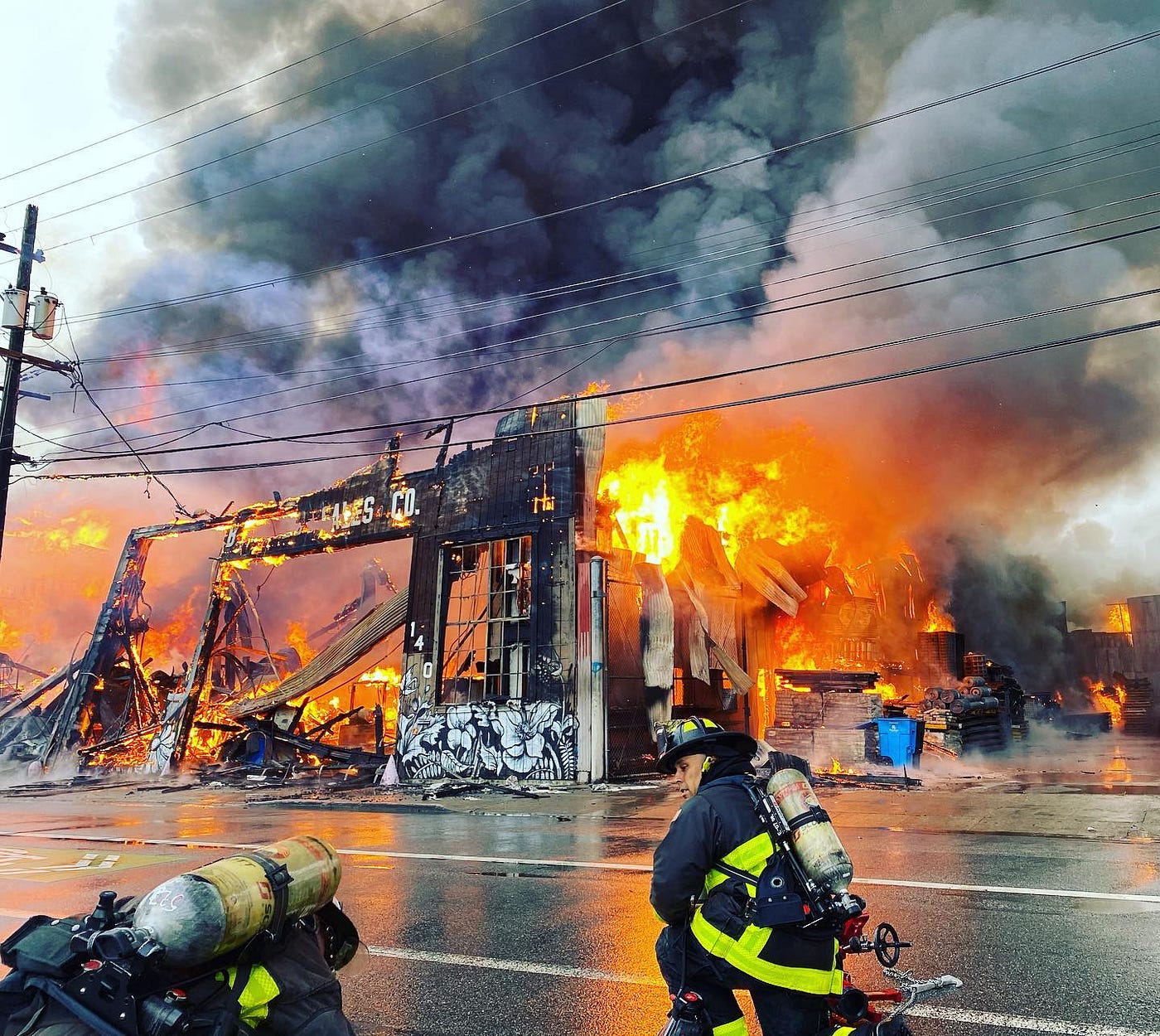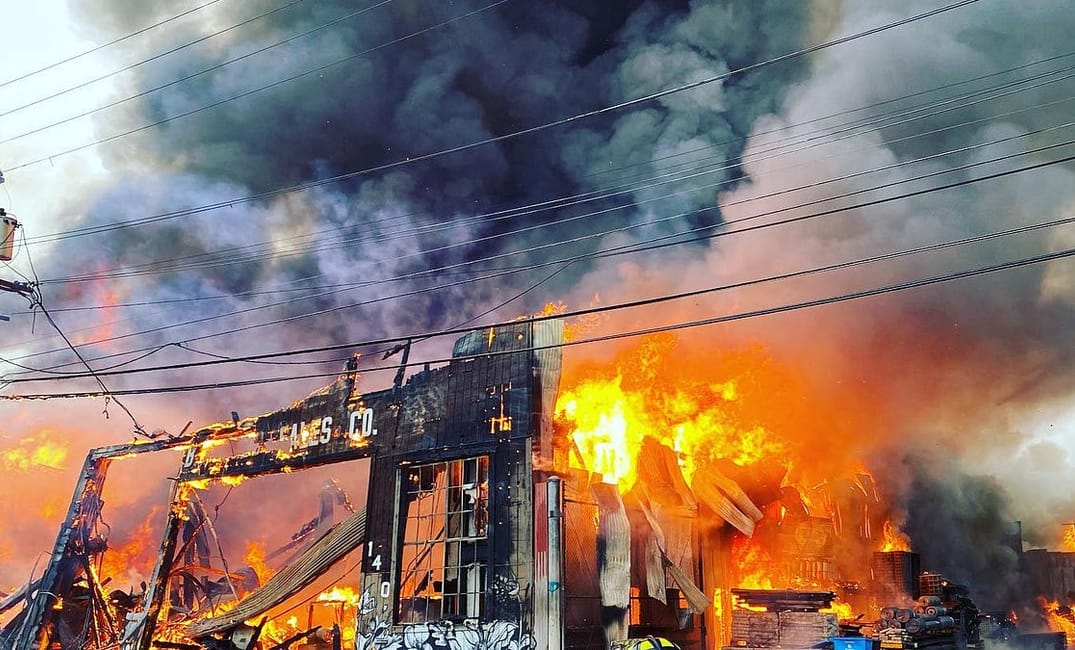
Disaster and restaurants are almost interchangeable terms these days, with Covid-19 continuing to wreak havoc on the food and beverage industry. From tiny mom-and-pop caterers to giant corporate chains — most have felt the sting of reduced operations or full-on closures.
As if a pandemic wasn’t enough, for a group of business owners trying to get by in San Francisco — it didn’t stop there. You probably remember that at the end of July, an enormous blaze engulfed six commercial buildings in SOMA. More than 160 firefighters responded, one of whom was injured. My boss’s catering business was one of the operations that went down in the destruction. She was based in a commissary kitchen that also housed other food businesses — most of them women, BIPOC, and/or immigrant-owned.
Back in the first week of shelter-in-place, I wrote about losing work as a tech company food caterer. Who would have expected what was to come — months of shutdown — and then, to top it all off, for a massive fire to destroy my place of work completely?
Initial media coverage of the fire was big, with apocalyptic news footage of flames and thick, black smoke dancing into the sky and even across the bay to Oakland. As for our kitchen — only the facade of the building remained, now cordoned off and slated to be demolished. Then the news cycle moved on. But what about now?
Food operations have had to pivot, pivot, and pivot again for survival. Now, some of these kitchen’s tenants are forced to pivot yet again in hopes of being one of the surviving 40% of restaurants predicted to make it. I reached out and spoke with many of these owners, and one thing is clear: They aren’t giving up and throwing in the kitchen towel just yet. And there are ways we can all help.
Crepe Madame
“Absolutely everything is gone,” my boss Laetitia Verdeaux of Crepe Madame told me of her eight-year-old crepe catering business; for the past five years, she operated out of that SOMA commercial kitchen. “All of my equipment was there… some I had held on to since the very beginning. Expensive machinery and supplies are now gone, in addition to more sentimental clientele gifts and pictures of staff from previous parties.”
For the past three months, Verdeaux held a pop-up at her friend’s Mission District Etcetera Wine Bar for delivery, takeout, and outdoor dining, but has since stopped. “If the catering business is not picking back up by the end of the year, then I will have to come up with other ideas,” she said. “I won’t give up. It will come back.”
My co-worker created a GoFundMe campaign soon after the team learned of the fire, and Verdeaux is waiting to hear about her application to the San Francisco Office of Economic and Workforce Development’s (SF OEWD) Disaster Relief Fund.
Hooray Foods
Founder Sri Artham is fully leaning into the plant-based meat craze with Hooray Food’s vegan bacon. Hooray currently supplies its goods to The Plant Café Organic and is looking to expand its customer base. I got to sample iterations of the crunchy, smoky “meat” throughout the product’s evolution, happy to witness developments such as realistic-looking bacon molds. Artham said the shared space was used as a “test kitchen and to produce samples.” Most of the company’s equipment was at a Bay Area co-packing facility. “We were fortunate to have only lost a small amount of finished product, ingredients, and small equipment — perhaps totaling $2,000 to $3,000,” said Artham.
Sign up for The Bold Italic newsletter to get the best of the Bay Area in your inbox every week.
Hooray was part of a joint kitchen tenant fundraiser that ended earlier this month, though generously gave its share to the other participants. “The damage to them was much greater than the damage to us,” Artham said. Hooray was able to return to its previous research and design kitchen in the city, and its operations resumed a week after the fire.
Eko Kitchen
It’s hard to believe that there is only one exclusively Nigerian restaurant in San Francisco. Simileoluwa Adebajo is the young founder behind it, having left her financial analyst job to fulfill a cultural mission. Adebajo’s Eko Kitchen splashed onto the food scene in May 2018, garnering attention from Bon Appetit, Eater, and the San Francisco Chronicle. After Covid-19 hit, Adebajo partnered with SF New Deal to produce meals for people in need, operating off donated funds through that program. At the time of the fire, she was splitting her time between the SOMA shared space and another kitchen in the area.
“We lost 80% of our inventory and equipment, and almost all of the stuff we import from Nigeria,” Adebajo said of the fire losses. Her strong media profile and large personal network secured immediate publicity of the tragedy, and she organized a joint fundraiser for Eko and four other tenants. Since Hooray Foods gave its share to the remaining participants, Adebajo issued $8,000 checks to each tenant this week — double the original $4,000 goal. The rest of the fundraiser remains open for Eko Kitchen. Adebajo is also waiting on word from SFOEWD and her insurance.
Fabien Santos, owner of Merkado Mexican restaurant and open-air market near Oracle Park, reached out to Adebajo after reading about the fire. Eko Kitchen will temporarily operate there for SF New Deal and Sunday dinner pickups.
Green Tiffin
As one of the oldest tenants of the SOMA shared kitchen, Adrian Tay, originally from Malaysia, had been delivering plant-based lunches in reusable tiffins via e-bikes for years through his company Green Tiffin. Tay lost 90% of business due to Covid-19 and had just started to make space for other tenants when the fire hit. “It was just weird timing… we still lost equipment and inventory. Our work laptop was there,” Tay said. While he takes this time to rethink his business model, Tay is still available for larger orders using friends’ restaurant kitchen spaces. “With our environment now, we really hope to see Green Tiffin making a comeback. We need more green businesses for the future,” Tay said.
Green Tiffin has its own GoFundMe campaign and is also waiting to hear on insurance claims. “It’s a mental challenge to overcome… I think that’s the biggest part,” Tay said, illuminating another aspect of the stress that most food business owners are experiencing now.
Other tenants in the space included Indonesian food purveyor ChiliCali. Keep an eye on its website or Instagram, as it will resume business at the end of the month.
People who still want to donate to these businesses can reach out to each one individually. Whether through industry friends or strangers reaching out after news of the fire — mutual aid has proven to be the fastest form of help. Most food and beverage businesses operate at too thin of a margin to wait weeks or even months for the paperwork to be processed in a system overwhelmed by coronavirus-related aid applications.
That said, government support for the restaurant industry is still vital.
Read more like this:







